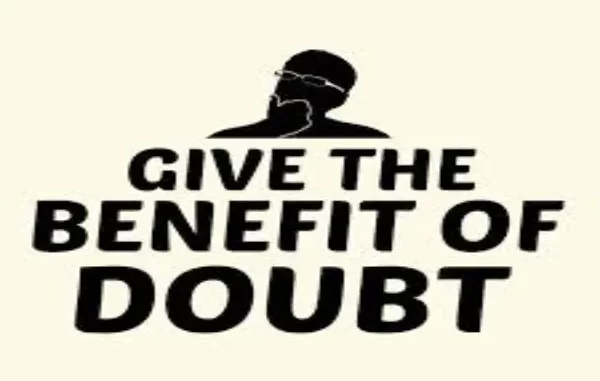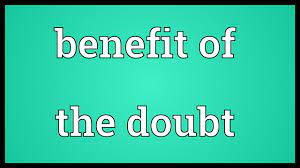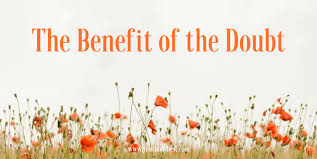
In an international world frequently marked by skepticism and cynicism, the idea of giving someone the “benefit of the doubt” shines as a beacon of agreement, information, and fairness. This undying principle underscores the value of assuming advantageous intentions and withholding judgment in the absence of concrete proof. As we delve into the profound implications of extending the benefit of the doubt, we uncover an effective device for nurturing wholesome relationships, fostering empathy, and building bridges of expertise.
The Foundation of Trust
At the heart of the benefit of doubt lies the foundation of trust. When we give a person the benefit of the doubt, we know that people are inherently able to have suitable intentions. This act of agreeing forms the bedrock upon which relationships—be they non-public, professional, or societal—can flourish. By defaulting to an assumption of goodwill, we set the degree for open communication, mutual appreciation, and the forging of lasting bonds.
Embracing Complexity and Context
Human interactions are regularly complex and motivated by a mess of factors that might not be immediately obvious. Giving the benefit of the doubt recognizes this complexity and encourages us to remember the wider context in which movements or statements arise. A rushed comment, a misunderstanding, or outside stressors can all contribute to behaviors that might be misinterpreted. By refraining from hasty judgments, we allow room for a greater nuanced knowledge of the scenario.
Promoting Empathy and Connection

Extending the benefit of the doubt is exercising empathy—a conscious effort to position ourselves in another individual’s footwear. It’s a recognition that each person has their own set of studies, emotions, and struggles. By approaching interactions with an empathetic mindset, we foster an experience of connection and a willingness to listen, study, and find common ground.
Mitigating Bias and Stereotyping
Our minds are vulnerable to biases and stereotypes, regularly leading us to make judgments that won’t accurately reflect the truth. By consciously selecting to provide the benefit of the doubt, we overcome those biases and counteract the tendency to make assumptions based on preconceived notions. This practice is specifically effective in preventing discrimination and increasing inclusivity.
Encouraging Personal Growth

When we extend the benefit of the doubt, we create an environment that encourages personal growth and mastery. Individuals are much more likely to reflect on their moves and motivations after they sense that others are inclined to give them a chance. By providing this threat, we motivate people to take responsibility for their movements and attempt self-development.
Navigating Misunderstandings
Misunderstandings are an inevitable part of human interactions. By removing the doubt, we lay the groundwork for a healthy war resolution. Instead of assuming unwell intent, we approach the scenario with an open mind, facilitating efficient conversations that may result in clarity.
Cultivating a Positive Culture

Whether in families, workplaces, or broader groups, a lifestyle that embraces the benefit of the doubt is inherently advantageous. Such a subculture fosters an environment of trust, collaboration, and help. It encourages people to take risks, share their opinions, and make contributions from their specific perspectives without worrying about being unfairly judged.
Balancing Caution with Openness
While giving the benefit of the doubt is an effective tool for promoting positive information, it’s essential to strike a balance between warning and openness. Critical thinking and discernment should no longer be abandoned absolutely; instead, they ought to be carried out thoughtfully and without a rush to judgment.
A Ripple Effect of Positivity

The practice of giving the benefit of the doubt is not limited to man-woman interactions; it ripples outward to form the fabric of society. When more humans practice this principle, it creates a chain reaction of positivity, fostering a world where empathy, expertise, and agreement flourish.
In a world that frequently challenges our willingness to believe, extending the benefit of the doubt serves as a reminder of our shared humanity. By choosing to look for the best in others and reserving judgment, we make a contribution to a world that is kinder, more compassionate, and more united.






Leave a Reply